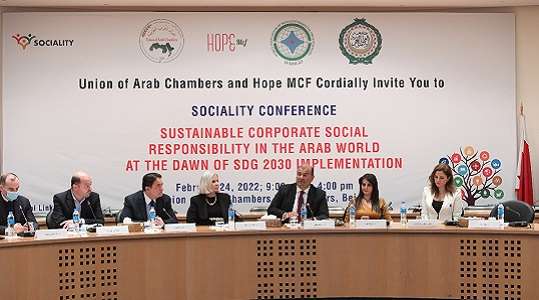Union of Arab Chambers, in cooperation with the HOPE MCF Foundation, the Social Affairs Department of the League of Arab States, and the New York-based World Confederation of Non-Governmental Organizations WANGO organized, a conference on February 24, 2022 at the headquarters of the Union of Arab Chambers in Beirut, under the title: “Sustainable Corporate Social Responsibility in the Arab World: Implementing the 2030 Sustainable Development Goals”, within the framework of achieving the sustainable development goals of the United Nations Development Program for the year 2030, where the need for unified and transparent cooperation between companies and civil society has become an essential element in achieving development for countries.
The Secretary-General of the Union of Arab Chambers, Dr. Khaled Hanafi, spoke at the opening of the conference, noting that "convening the conference in Beirut, especially in light of these circumstances that Lebanon is going through, confirms that Beirut will remain vibrant and hopeful despite all the pressures and circumstances that Lebanon is going through.” Pointing out that "many of the participants' keenness to come to Lebanon is a message of support and love that confirms that Beirut is in the heart and conscience of the Arab countries." We hope that the situation in Lebanon will stabilize, and Beirut will regain its health and brilliance, as it was accustomed to in the past.
Hanafi touched on the importance of corporate social responsibility in the Arab world, pointing out that “The social responsibility of businessmen is not limited to mere participation in charitable work and voluntary campaigns. In addition to adhering to the applicable laws and regulations, there are matters related to health and environmental aspects, observance of human rights, especially the rights of workers, development of the local community, commitment to fair competition and avoidance of monopoly, and consumer satisfaction. It also includes transparency at work, and avoiding administrative, financial and moral corruption, and other factors that are linked to each other, and collectively form the basis of corporate social responsibility.”
He said: “We live in a changing time, and from this standpoint, it is necessary to adopt methods that are commensurate with the changes taking place in order to enhance the reality and role of corporate social responsibility, in line with the digital and industrial revolution, blockchain, the Internet of things, and other modern concepts that have replaced old concepts, which would contribute to improving services provided to society and creating real job opportunities, paying fair wages, ensuring the safety of workers and employees, and participating in finding solutions to social and environmental problems.”
Also speaking at the opening session were: Dr. Nadia Shuaib, President of the Muhammad Shuaib Charitable Foundation, Dr. Charles Arbid, President of the Economic and Social Council in Lebanon, Tawfiq Dabboussi, President of the Chamber of Tripoli and the North in Lebanon, and Dr. Haifa Abu Ghazaleh, Head of the Economic and Social Affairs Sector at the League of Arab States, and the President of the World Federation of Non-Governmental Organizations, Dr. Taj El-Din Hamad. Within the framework of the event, three working sessions were held, the first of which was titled: "Standards, Quality Assurance and Responsibility for Implementation in Companies". The second session was entitled: "Supporting Social Responsibility in the Arab World". While the third session presented selected examples of successful social responsibility in the Arab world. The conference also included the launch of the Best Ideal NGO Award (BINGO 3), which was previously awarded in Lebanon in 2014 and 2015 under the initiative and sponsorship of Hope MCF, in cooperation with the Ministry of Social Affairs, the Ministry of Interior and the United Nations Development Programme, which will now be awarded at the regional level in cooperation with various regional partners.
Source (Union of Arab Chambers)

